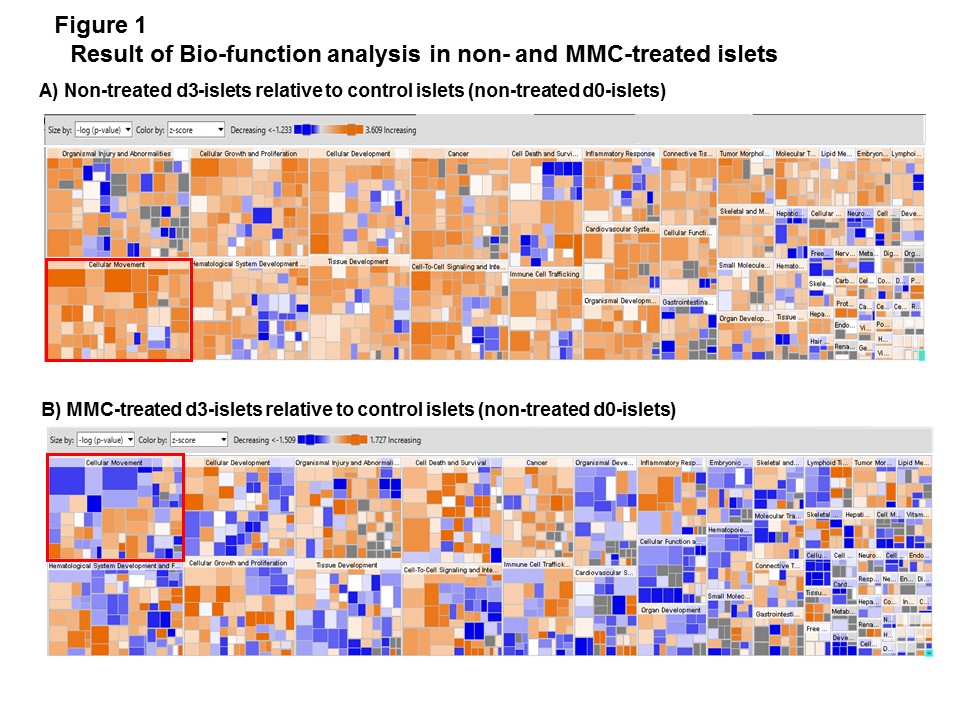Ex-Vivo Mitomycin-C Exposure Reduced Immunogenicity and Prolonged Survival of Islets by Suppressing the Secretion of Multiple Chemotaxis Factors.
1Department of Surgery, Division of Hepato-Biliary-Pancreatic and Transplant, Fukushima Medical University, Fukushima, Japan
2Department of Surgery, Graduate School of Midicine, Kyoto University, Kyoto, Japan
Meeting: 2017 American Transplant Congress
Abstract number: B50
Keywords: Islets, Xenotransplantation
Session Information
Session Name: Poster Session B: Allorecognition and T Cell Biology
Session Type: Poster Session
Date: Sunday, April 30, 2017
Session Time: 6:00pm-7:00pm
 Presentation Time: 6:00pm-7:00pm
Presentation Time: 6:00pm-7:00pm
Location: Hall D1
Background. Strategies to reduce immunogenicity of islets, and to prevent activation of pro-inflammatory events are essential to successful islet engraftment. We previously demonstrated that ex-vivo Mitomycin-C (MMC) pretreatment significantly prolonged graft survival. However, a mechanism of MMC-induced engraftment remains poorly characterized. The aim of this study is to determine the biological mechanisms of the reduction of immunogenicity and the prolongation of survival of MMC treated islet. Methods. We employed microarray analyses of untreated and MMC-treated islets of rats, and compared them. Ingenuity pathway analysis (IPA) was used to identify biological processes that were mostly associated by MMC pretreatment. Results. The bio-function analysis by IPA revealed that more than half of biological functions were down-regulated in MMC-treated islets and identified Cellular Movement as the most significant down-regulated function. Especially, multiple genes encoding pro-inflammatory mediators with chemotactic activity were down-regulated significantly. Validation using protein assay revealed the levels of IL-6, MCP-3, and MMP-2 in culture supernatants of MMC-treated islets were significantly decreased compared with controls (IL-6; p<0.05, MCP-3; p<0.01, and MMP-2; p<0.05). Moreover, the monocyte-chemotactic activity of MMC-treated islets was significantly suppressed(p<0.01). Conclusion. Ex-vivo MMC pretreatment of islets simultaneously suppresses the secretion of chemotaxis factors, inducing the synergistic suppression of leukocyte chemotaxis, which is considered as a key process for enhancing islet graft survival.
Especially, multiple genes encoding pro-inflammatory mediators with chemotactic activity were down-regulated significantly. Validation using protein assay revealed the levels of IL-6, MCP-3, and MMP-2 in culture supernatants of MMC-treated islets were significantly decreased compared with controls (IL-6; p<0.05, MCP-3; p<0.01, and MMP-2; p<0.05). Moreover, the monocyte-chemotactic activity of MMC-treated islets was significantly suppressed(p<0.01). Conclusion. Ex-vivo MMC pretreatment of islets simultaneously suppresses the secretion of chemotaxis factors, inducing the synergistic suppression of leukocyte chemotaxis, which is considered as a key process for enhancing islet graft survival.
CITATION INFORMATION: Sato N, Anazawa T, Kenjyo A, Kimura T, Okada R, Ishigame T, Kofunato Y, Watanabe J, Muto M, Nishimagi A, Gotoh M, Marubashi S. Ex-Vivo Mitomycin-C Exposure Reduced Immunogenicity and Prolonged Survival of Islets by Suppressing the Secretion of Multiple Chemotaxis Factors. Am J Transplant. 2017;17 (suppl 3).
To cite this abstract in AMA style:
Sato N, Anazawa T, Kenjyo A, Kimura T, Okada R, Ishigame T, Kofunato Y, Watanabe J, Muto M, Nishimagi A, Gotoh M, Marubashi S. Ex-Vivo Mitomycin-C Exposure Reduced Immunogenicity and Prolonged Survival of Islets by Suppressing the Secretion of Multiple Chemotaxis Factors. [abstract]. Am J Transplant. 2017; 17 (suppl 3). https://atcmeetingabstracts.com/abstract/ex-vivo-mitomycin-c-exposure-reduced-immunogenicity-and-prolonged-survival-of-islets-by-suppressing-the-secretion-of-multiple-chemotaxis-factors/. Accessed February 9, 2026.« Back to 2017 American Transplant Congress
